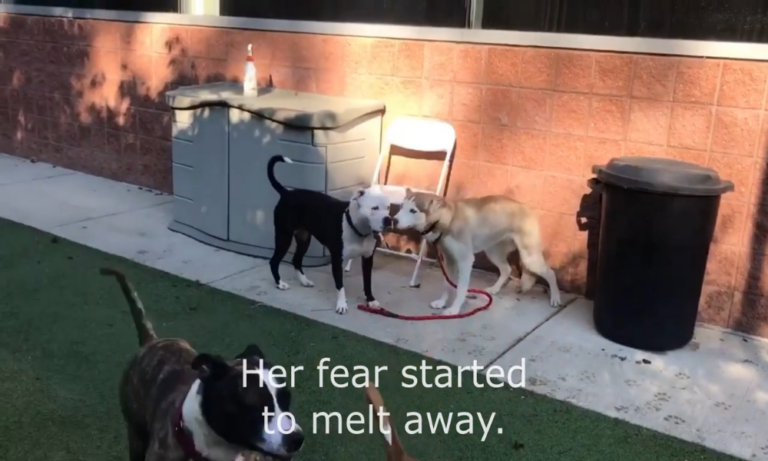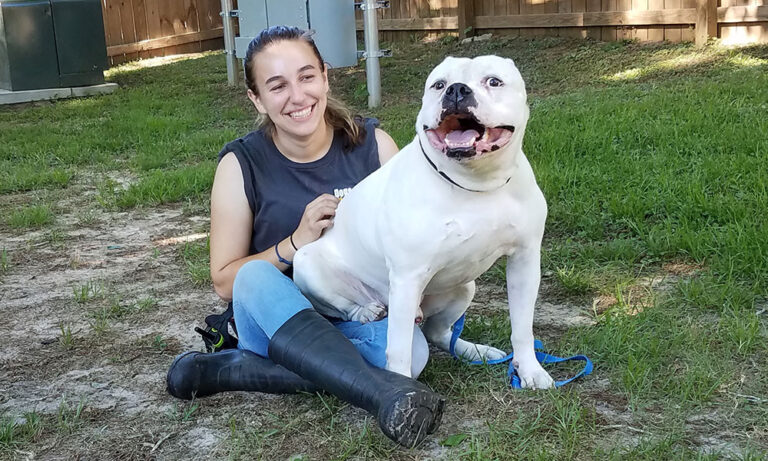In July 2017, Dogs Playing for Life visited Kokomo Humane Society to implement our Every Dog, Every Day! Seminar to teach them how to enrich the lives of their dogs by running daily playgroups. Since then, we've helped them become...
Read MoreREPORT: COVID-19 SHELTER SURVEY
Introduction
In early 2020, the United States saw its first confirmed cases of the novel coronavirus, COVID-19. On March 13, President Trump declared a national emergency, and less than two weeks later, the United States led the world in confirmed coronavirus cases (Taylor, 2020). Starting in late March, states began implementing stay-at-home orders in an attempt to limit the spread of the virus.
Casinos and Community: How Gambling Establishments Support Local NZ Charities
When it comes to the relationship between casinos and the local community, there is often a misconception that gambling establishments only benefit themselves. However, the reality is quite different. In New Zealand, casinos play a significant role in supporting local charities and giving back to the community. This article will explore the various ways in which casinos contribute to the betterment of society and highlight the positive impact they have on local communities.
Supporting Local Charities
One of the primary ways in which casinos in New Zealand contribute to the community is through supporting local charities. These establishments understand the importance of giving back and actively engage in fundraising activities to support various causes. Many casinos organize charity events, such as poker tournaments or gala evenings, where a portion of the proceeds goes directly to local charities.
For example, the popular online casino released hosts an annual charity poker tournament, with all entry fees donated to a local charity of choice. This not only raises funds for a good cause but also brings the community together in a fun and engaging way.
In addition to hosting events, casinos also make regular donations to local charities. They understand the importance of supporting organizations that address social issues and strive to make a positive impact on the lives of those in need. These donations help fund essential programs and services that benefit the local community.
Creating Employment Opportunities
Another way in which casinos support the local community is by creating employment opportunities. The gambling industry provides a significant number of jobs across various sectors, including hospitality, entertainment, and customer service.
By offering employment opportunities, casinos contribute to the economic growth of the community. They provide stable jobs with competitive salaries and benefits, which help improve the overall standard of living for individuals and families in the area.
Moreover, casinos often prioritize hiring local residents, further strengthening the connection between the establishment and the community. This not only reduces unemployment rates but also fosters a sense of pride and belonging among locals.
Sponsorship and Community Initiatives
Casinos in New Zealand also actively engage in sponsorship and community initiatives to support local organizations and events. They understand the importance of investing in the community and often sponsor sports teams, cultural festivals, and other community-oriented activities.
Through sponsorship, casinos not only provide financial support but also help promote and raise awareness about these events. This contributes to the overall vibrancy and well-being of the community, fostering a sense of unity and pride.
Moreover, casinos often collaborate with local organizations to develop community initiatives that address specific needs. For example, they may partner with addiction support groups to promote responsible gambling or work with local schools to provide educational programs on gambling awareness.
These initiatives further demonstrate the commitment of casinos to the community, ensuring that their presence goes beyond just providing entertainment and gambling opportunities.
In Conclusion
Contrary to popular belief, casinos in New Zealand play a vital role in supporting local charities and giving back to the community. Through fundraising events, regular donations, and sponsorship, they actively contribute to the betterment of society. Additionally, by creating employment opportunities and engaging in community initiatives, casinos strengthen the bond between themselves and the local community. Their efforts go a long way in improving the overall well-being and prosperity of the areas in which they operate.
Along with businesses like grocery stores, gas stations, and banks, animal shelters have generally been considered essential businesses and have continued to care for their animals even during statewide shutdowns (Humane Society of the United States, 2020), albeit often with smaller crews and typically while being temporarily closed to the public or open by appointment only. When stay-at-home orders were issued across the United States, shelter administrators everywhere found themselves having to create new protocols around staffing, volunteers, adoptions, and foster homes.
Many shelters have also seen an uptick in animals sent to foster homes in the midst of the coronavirus pandemic (Fies, 2020; Garrand, 2020; Karikari, 2020). Pethealth Services (2020), having analyzed data from 1,191 PetPoint shelter software users, reported an 11 percent increase in dogs in foster since the start of the pandemic (March 13-July 31, 2020) compared to the same period last year.
Shelter Animals Count, a nonprofit organization that gathers and stores statistics on sheltered animals, recently published a report comparing animal intakes and outcomes for the first half of 2019 to the first half of 2020 using data from 1,270 municipal and private shelters and rescue organizations that voluntarily reported their numbers for these two periods (Shelter Animals Count, 2020). For the first half of 2020, intakes were down 24 percent, including a 24 percent decrease in owner surrenders (Shelter Animals Count, 2020). Adoptions were down 16 percent, but up 6 percent when measured as a percentage of total intake (Shelter Animals Count, 2020). Euthanasia was down 43 percent (Shelter Animals Count, 2020).
All these factors have combined to make the recent months an unprecedented time in sheltering. As the broader effects and implications of the pandemic have prompted some organizations and experts to begin rethinking basic animal sheltering models, a movement has developed that aims to make sheltering more community-facing rather than inward-facing, in part through a greater reliance on foster homes (Human Animal Support Services, 2020; Jefferson, 2020; Miller, 2020).
In an attempt to learn how the COVID-19 pandemic has affected shelters’ use of playgroups, Dogs Playing for Life (DPFL) issued a brief, five question survey to every organization that has hosted a DPFL playgroup seminar. Respondents were asked how, if at all, COVID-19 has changed their playgroups from the frequency with which they are held to the percentage of dogs getting out regularly. For the shelters that have stopped running playgroups due to the pandemic, DPFL sought to uncover the specific reasons why playgroups have ceased. Finally, where shelters sent an increased number of dogs to foster homes in response to the pandemic, DPFL asked whether playgroups helped shelters place dogs into the most appropriate foster homes.
Methods
The distribution list for the survey was taken from the contacts database within DPFL’s Customer Relationship Management software. Each shelter that DPFL has visited was represented and, in cases where there were multiple email addresses on file for a single shelter, all but one was eliminated so that each shelter only received one survey request.
The survey was distributed via email on June 19, 2020, using the Google Forms survey platform. It contained four questions about the ways in which COVID-19 has affected shelter playgroups as well as one additional question related to shelters’ need for an advanced board-and-train facility, and a space at the end for comments.
In addition to the initial survey request in June, which included the survey due date of July 20, a reminder email was sent to all shelters that had not yet responded on July 16. In all, 242 surveys were sent out and 73 were submitted for a response rate of 30 percent.
Results
The primary goal of the survey was to determine whether and how the COVID-19 pandemic has affected shelters’ use of playgroups. First, respondents were asked about the frequency with which they have run playgroups during the pandemic. Figure 1 shows that approximately one quarter (24.7%) of responding shelters answered that playgroups have happened more frequently since the pandemic. On the other hand, nearly a third (31.5%) responded that playgroups have happened less frequently since the pandemic. Another 27.4 percent of shelters reported no change in the frequency with which they run playgroups, and 16.4 percent of shelters were not running playgroups at all.
Figure 1: Frequency with which Shelters have Run Playgroups During the Pandemic
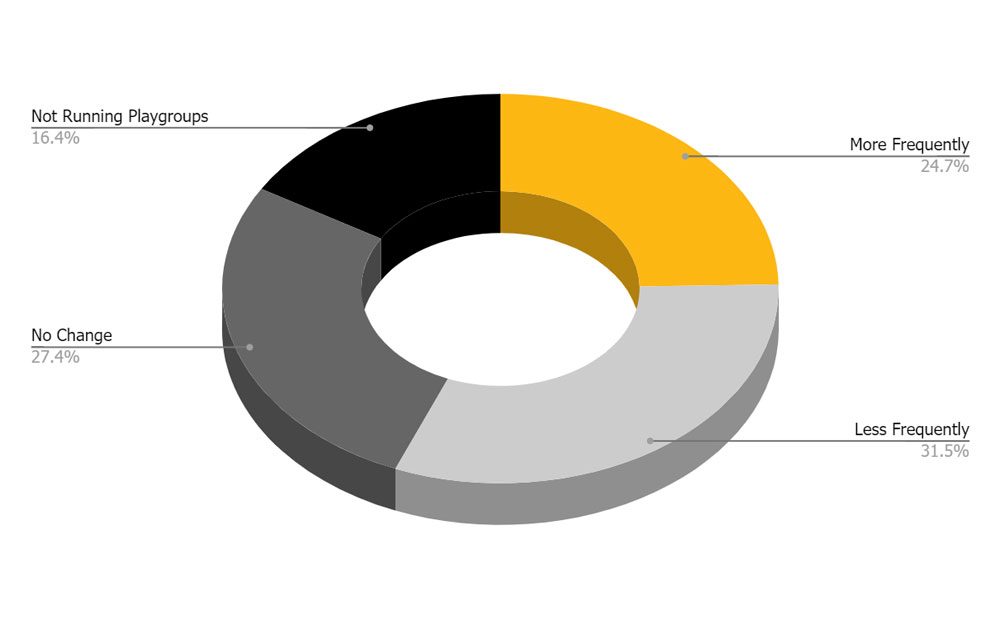
Next, the survey asked shelters whether the percentage of total on-site dogs attending playgroups on a regular basis has increased, decreased, or stayed the same. Figure 2 shows that nearly one third (32.9%) of shelters responded that a larger percentage of their total on-site dogs are attending playgroups regularly. Another 27.4 percent of shelters reported getting a smaller percentage of their dogs to playgroups on a regular basis, and 21.9 percent reported no change since the pandemic. Finally, 17.8 percent of shelters reported that they are not currently running playgroups.
Figure 2: Percentage of Total On-Site Dogs Getting to Playgroup on a Regular Basis
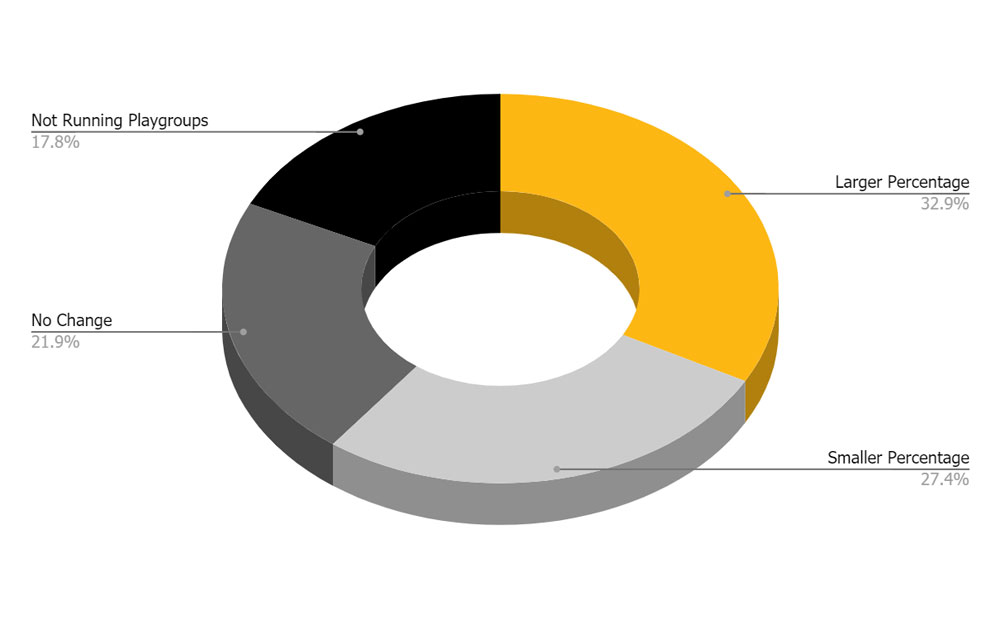
The third survey question asked respondents, “If you have stopped running playgroups during the pandemic, what is the primary reason?” Figure 3 shows that of the 12 respondents who reported in questions one and two that their shelter is not currently running playgroups, 41.7 percent of those had stopped due to a reduced number of staff, while another 16.7 percent reported that a reduced number of dogs on site had caused them to stop running playgroups. The remaining five respondents checked the “other” box and filled in their answers. One attributed their cessation to having too few dogs and too few staff (8.3%). The final four responses (33.3%) all referenced precautionary, social-distancing measures taken by the shelter that precluded playgroups, either due to new protocols concerning volunteers or rules requiring social distancing more generally. [1]
[1] While we would expect the number of respondents answering “we are not currently running playgroups” to be the same for both questions where this was an optional response, a single shelter responded “playgroups have happened less frequently” to the first question, and “we are not currently running playgroups” to the second question.
Figure 3: Reasons Shelters Stopped Running Playgroups
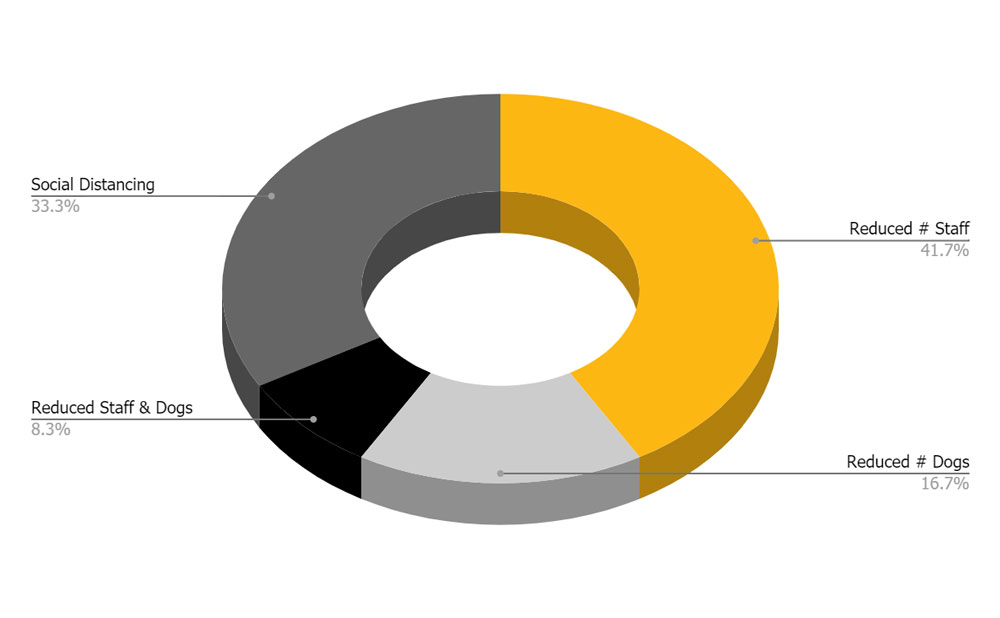
With all the reports of shelters sending larger numbers of dogs to foster homes due to the pandemic, DPFL was eager to learn whether shelters were able to use information gained through playgroups to place dogs into appropriate foster homes. Playgroups, in addition to their myriad other benefits, provide information about a dog’s energy level, playstyle, general sociability with other dogs, housetraining and elimination habits, comfort with new people, and general leash manners. All of these factors contribute to a more complete understanding of each dog as an individual. Shelters can use this greater understanding to make more appropriate matches and reduce the likelihood of dogs being placed into homes with which they are not compatible or being returned from foster early.
Figure 4 shows that the vast majority of responding shelters, 78.1 percent, reported that information gained through playgroups played a role in placing dogs into appropriate foster homes. Another 13.7 percent of respondents said they had not sent dogs to foster homes as a result of the pandemic, and only 8.2 percent of shelters reported that playgroups were not helpful in this regard.
Taking a closer look at the six shelters that responded that playgroups had not helped them place dogs in foster homes, three shelters reported that they were not currently running playgroups, and the other three reported that playgroups had been happening less frequently and with a smaller percentage of the shelter’s on-site population since the start of the pandemic. Thus, it is possible that the reason playgroups were not helpful in these cases is that they were not being run with sufficient frequency to provide useful information. In fact, one respondent intimated as much in the comments section of the survey.
Figure 4: Playgroups Play a Role in Placing Dogs into Appropriate Foster Homes
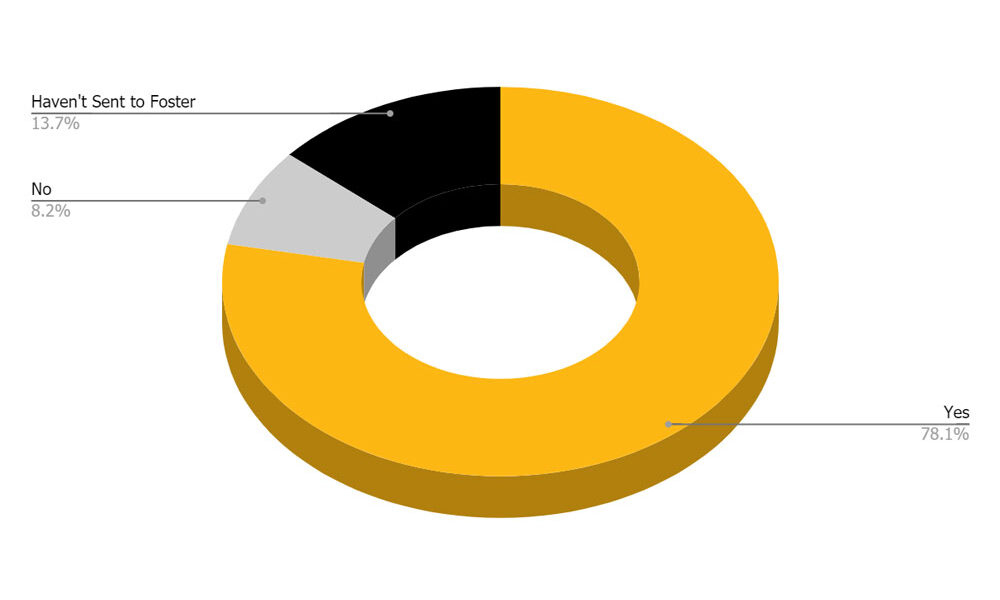
In the survey’s final, optional comments section, several themes emerged. First, of the 32 respondents who provided comments regarding operations during COVID-19 or their need for an advanced board-and-train facility, 25 percent referenced an increased reliance on foster homes and a larger number of dogs in foster. Next, a number of commenters (22%) remarked on smaller playgroup sizes during the pandemic, presumably due to decreased intakes and/or a larger number of dogs sent to foster homes. Along these lines, four respondents (12.5%) also mentioned having trouble finding helper dogs and “rock stars” during the pandemic, often because these dogs were among the easiest to place into foster homes.
In addition to descriptions of fewer staff members or staff members split into shifts, several commenters (6%) also noted that playgroups were even more helpful during the pandemic because they allowed shelter staff to provide enrichment to multiple dogs at once, thereby taking up less time and fewer resources.
Notably, some shelters also reported on the unexpected benefits of COVID-19, referring to extra time for playgroups due to shelter closures or lighter foot traffic (19%) and extra time to train new playgroup handlers (6%).
A final theme that emerged in the survey comments was the importance of volunteers in running playgroups. Some shelters referenced limiting or being temporarily closed to volunteers, and 12.5 percent of commenters said this in and of itself had limited or ceased their ability to run playgroups during the pandemic.
Discussion and Conclusions
Ultimately, while the COVID-19 pandemic has upended much of daily life throughout the country, its impact on playgroups for shelter dogs has been mixed. Just over half (52.1%) of shelters reported running playgroups more frequently or just as frequently as before the pandemic. Similarly, 54.8 percent of shelters reported that a larger percentage or the same percentage of their on-site populations are getting out to playgroups regularly. On the other hand, nearly half of shelters are holding playgroups less often and/or sending a smaller percentage of their dogs to playgroups regularly, or have stopped running playgroups altogether.
Perhaps the most consequential finding of the COVID-19 Shelter Survey pertains to the impact of playgroups on placing dogs in foster homes. An improved ability to make good foster matches is crucial in the current climate when many organizations are focusing on keeping shelter populations low during the pandemic. Even as we move forward from the coronavirus pandemic, this ability to make successful matches will continue to be important as the United States is expected to enter a new era in sheltering with a greater emphasis on keeping homeless animals out of shelters via the new Human Animal Support Services (HASS) model (Human Animal Support Services, 2020).
While survey respondents’ resounding embrace of playgroups as a tool for foster placement is impressive, this result is not surprising given the findings from other DPFL surveys. Specifically, in post-seminar surveys, 98 percent of shelters indicated that playgroups help make better adoption matches, while 95 percent of respondents indicated that playgroups tell shelters more about a dog than just its sociability with other dogs (Dogs Playing for Life, forthcoming). What’s more, playgroups have already been found to be linked to reduced lengths of stay for dogs in shelters throughout the country. After implementing DPFL playgroups, shelters’ canine length of stay numbers decreased from an average of 30 days to 23 days, while shelters running playgroups for at least a year experienced an even more impressive 33 percent decrease in canine length of stay numbers (Dogs Playing for Life, forthcoming).
DPFL’s mission is to redefine “the meaning and importance of quality of life for all sheltered dogs by improving their experience through playgroups and individualized training, resulting in urgent and responsible lifesaving” (Dogs Playing for Life, 2020). Asked whether dogs in their care experience better quality of life as a result of playgroups, 99 percent of shelters surveyed following a playgroup seminar responded in the affirmative (Sadler, 2020). In this way, while the immediate impact of playgroups is often to improve a dog’s immediate quality of life, the responses to DPFL’s COVID-19 Shelter Survey make it clear that the benefits of playgroups extend far beyond a dog’s experience in the shelter. Though animal sheltering has changed dramatically in the months since the COVID-19 pandemic began and is expected to continue to change and evolve in the coming months and years, shelters that find ways to sustain their playgroup programs even in these uncertain times may find playgroups to be an invaluable tool in securing the very best foster—and adoptive—homes.
SHARE ON SOCIAL Media:
References
Fies, A. (2020, April 2). People and pets help each other through coronavirus pandemic. ABC News.
Garrand, D. (2020, March 26). Coronavirus outbreak leads to uptick in foster pet applications. CBS News.
Human Animal Support Services. (2020). Elements of HASS.
Humane Society of the United States. (2020). Coronavirus (COVID-19) FAQ.
Jefferson, E. [Austin Pets Alive!]. (2020, June 22). Insight into Human Animal Support Services [Video]. YouTube.
Karikari, D., & Eaton-Robb, P. (2020, April 24). Pandemic leads to surge in animal adoptions, fostering. The Associated Press.
Miller, S. (2020, July 29). 20 ideas to thank your fosters. American Pets Alive!
Pethealth Services. (2020). COVID-19 Impact: Week 20.
Shelter Animals Count. 2020. The National Database COVID-19 impact June report.
Taylor, D. B. (2020, August 6). A timeline of the Coronavirus pandemic. The New York Times.
Success STORIES
Power of the Play
Trust us, you’re going to want to see this the whole way through. We’ve had the privilege of visiting the Cuyahoga County Animal Shelter twice to provide seminars to their incredibly dedicated team. Recently they shared the transformation of a...
Read MorePatton is Ready for
We have a soft spot for all of the dogs that come to Canine Center Florida (CCF), but some just work their way into our hearts a little bit deeper. Patton (whose friends call him Tuna) has been with us...
Read MorePretty Girl’s Amazing Transformation
For years, Pretty Girl was “feral” and was having litters of puppies in the woods. Many concerned citizens had tried to catch her for six months. When a nice family finally caught her, they did everything they could think of...
Read MoreSubscribe Now!
Learn about our vital work in your community, the latest training tips and techniques, and special stories of redemption and love.


